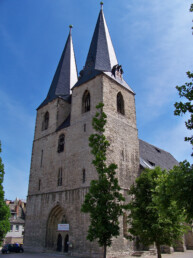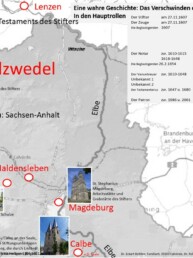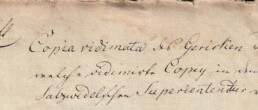The Testament

The original of the will (Latin: testament) of the childless founder Nicolaus III Gercken (1555 – 1610) signed November 27th,1607, has been lost during the thirty-years’-war (1618 – 1648). It either burned during the Great Fire of Magdeburg in 1631 or it was destroyed intentionally or accidentally by a certain Johann Linthe, who tried to usurp the property of the foundation during the thirty-years’-war. Preserved and stored in the city archive of Salzwedel is a complete, signed copy of the will handwritten by a notary public, which was authenticated and sealed in 1654 by the sons of this notary public. In the third addition of the family history published in 1996, Dr. Gunta Haenicke provided a version in contemporary German.
The will translated by Dr. Haenicke contains about 5000 words. The founder documents at length his faith in God. His main objective, to support the academic education of young adults, he introduces about 800 words into the will. Scholarship grants were supposed to be paid out only after the demise of his wife, Margaretha Busse. He gifts six cousins with a three-year scholarship at a university. The sons in law and their sons also receive 3-year scholarships. For good study results he sets out higher payments. For his own cousins the scholarship is extended to six years if they perform well at university. Doctorate students shall receive larger grants. For six descendents, who do not wish to pursue academic studies, the founder prescribes smaller scholarships. He asks those scholars who succeed materially to pay back a sixth to a tenth of their scholarship. He prescribes grants to poor unmarried maidens and widows. He limits the recipients to descendents of his grandfather unless the entire family perishes. In this case he limits the recipients to citizens of Neustadt Salzwedel. The oldest man in the family shall be patron. He pleads for reinvesting free cash flow. He adds his library to the foundation. He calls for integrity and against using the money for other purposes than set forth in his will. Finally, he gifts jewellery, food, and wine to family members, acquaintances and theologians he befriended.
The founder was concerned about his heritage and documented his will precisely. The will carries the founder’s seal and seven more seals of seven citizens and post holders in the city of Jüterbog. After the demise of the founder, one of his cousins, Georg Gercken (1588-1635), was designated the first patron by the family. The widow of the founder charged a notary public to administer the heritage. This notary’s public handwritten copy of the will is preserved to this day in the city archive of Salzwedel. An inventory of the founder’s heritage written by the same notary public and dated June 6th, 1611, i.e. the year after the founder’s demise, is also preserved and stored at Salzwedel city archive. The notary public died in 1650. In the context of the restoration of the foundation after the end of the thirty-years’-war, two sons of the notary public authenticated in 1654 the copy written by the notary public. They also authenticated a debt obligation issued by the city of Magdeburg to Sebastian Gercken, a son of Georg. The original of the debt obligation is also stored in the Salzwedel city archive.
Margaretha Busse, the wife of the founder, passed away on January 30th, 1621. Scholarships should have been granted thereafter, but the thirty-years’-war had led to minimal land lease income. The destruction of the city of Magdeburg in May 1631 and the loss of important documents impaired the foundation. On September 17th, 1647, Sebastian Gercken received a letter from the Salzwedel family authorizing him to restore the foundation. Since 1648 scholarships have been granted. The foundation grew into a capable institution. From 1648 on Sebastian also served as counseller in the patronate.
The will of the founder and its preserved documentation
Descendence since 1501 - Testament 1607 - Inheritance 1610 - Restoration from 1647- Preserved documents





